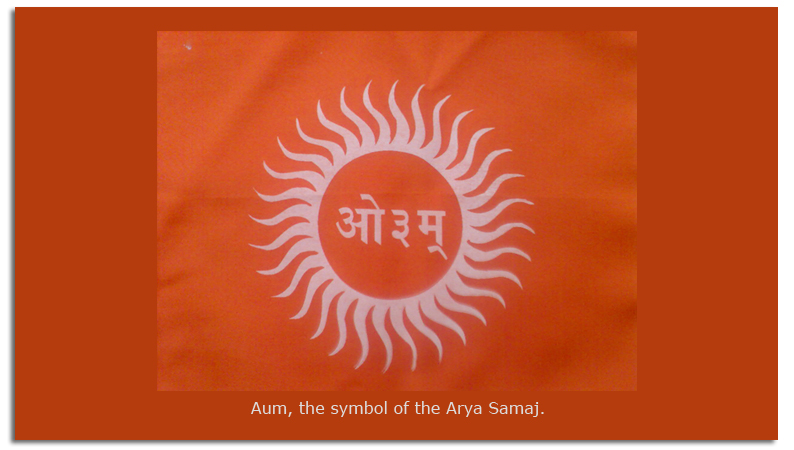Arya Samaj
What did he mean by Arya? Not a race, not member of a caste or class, but a person, any person, of highest nature (shreshtha), character and conduct, religiously pious, dedicated to Dharma, seriously motivated and dedicated positively, a pursuant of truth and knowledge, honest in thought, word and deed. People of this nature, character and conduct are, in Vedic terms, inheritors of the earth because they sustain the life and environment on earth.

The meaning of the word Samaj is "a united, integrated, harmonious, living and vibrant community, it self moving and moving and advancing all others to a life of peace and comprehensive all round progress, physically, mentally, culturally and spiritually, for the individual and society as a whole."
Swami Dayanand resolved to awaken India and the Hindu society. He introduced many positive reforms, among them the abolition of Sati Pratha, child marriage, dowry, un-touchability in the prevalent caste system, and introduction of women's education. He firmly believed that the yoke of the British Empire had to go. He emphasized the concept of nationhood by introducing the word Swaraj (self rule) for the first time and a need for one national language. In his famous book, Satyartha Prakash (The Light of Truth), he sought to dispel rituals, dogmas and superstitions among all Indians.
Principles
Arya Samaj is based on 10 basic principles.
1. God is the efficient cause of all true knowledge and all that is known through knowledge.
2. God is existent, intelligent and blissful. He is formless, omniscient, just, merciful, unborn, endless, unchangeable, beginning-less, unequaled, the support of all, the master of all, omnipresent, immanent, un-aging, immortal, fearless, eternal and holy, and the maker of all. He alone is worthy of being worshiped.
3. The Vedas are the scriptures of all true knowledge. It is the paramount duty of all Aryas to read them, teach them, recite them and to hear them being read.
4. One should always be ready to accept truth and to renounce untruth.
5. All acts should be performed in accordance with Dharma that is, after deliberating what is right and wrong.
6. The prime object of the Arya Samaj is to do good to the world, that is, to promote physical, spiritual and social good of everyone.
7. Our conduct towards all should be guided by love, righteousness and justice.
8. We should dispel Avidya (ignorance) and promote Vidya (knowledge).
9. No one should be content with promoting his/her good only; on the contrary, one should look for his/her good in promoting the good of all.
10. One should regard oneself under restriction to follow the rules of society calculated to promote the well being of all, while in following the rules of individual welfare all should be free.

 About
About